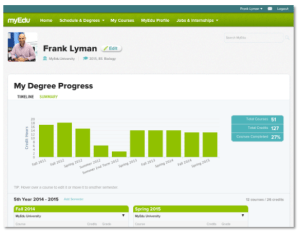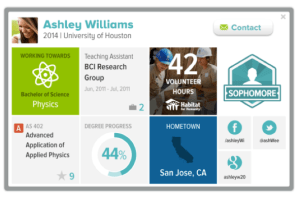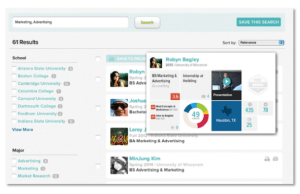Launched in 2010, Austin-based MyEdu set out to help students reduce the cost of earning a college diploma and remove the friction from every aspect of the higher education process, from deciding on the right school to finding post-graduate employment. Since then, the startup has been methodically collecting data from students as well as official academic data from universities to identify patterns that lead to higher costs (and lower retention rates).
Today, MyEdu offers students the ability to view ratings of both professors and courses to help them choose the right fit, along with providing a single place to access to course descriptions, evaluations, schedule planners and degree roadmap and progress dashboard, which allow students to build an academic plan and keep tabs as they advance towards a degree. On the flip side, MyEdu gives professors, students and companies access to 225 million official GPA records to track student achievement and outcomes.
MyEdu’s academic data and insight collectively make up what it believes is currently the largest academic repository of course, grade history and degree information in the U.S., which it is leveraging to power secure, cloud-based education apps that help students better plan and manage semesters and degrees, a la Edmodo.
 Superlatives aside, the model (which is free) has led to continuing adoption, and MyEdu is now collecting data from more than 800 (two-year and four-year) institutions. The startup added 5.3 million users in 2011 and the founders say that it is on pace to double that by the end of this year. As a result, MyEdu also revealed that it has now raised over $20 million in outside investment, with the majority of the capital coming from Bain Capital Ventures and its strategic investor, The University of Texas.
Superlatives aside, the model (which is free) has led to continuing adoption, and MyEdu is now collecting data from more than 800 (two-year and four-year) institutions. The startup added 5.3 million users in 2011 and the founders say that it is on pace to double that by the end of this year. As a result, MyEdu also revealed that it has now raised over $20 million in outside investment, with the majority of the capital coming from Bain Capital Ventures and its strategic investor, The University of Texas.
Up to this point, while the startup claims to help students manage every part of the academic process, it’s been fairly limited in its post-collegiate employment options. So, today the startup is launching a new service that aims to more effectively bridge the gap between higher ed and employment by helping students find quality job and internship opportunities and allowing employers to improve their college recruiting efforts. Corporate pilot program members include companies like Ernst & Young, VMware, Macy’s and ADP.
For students, MyEdu’s new platform now offers a familiar, LinkedIn-like experience, allowing them to create academic profiles where they can feature their coursework, skills, talents, or highlight personal experiences (like language skills and certifications, for example), while connecting directly with other students and employers. MyEdu’s new platform is free for both students and institutions.
 Meanwhile, employers pay a monthly SaaS fee to access the new platform, which gives them the ability to target job postings and identify candidates using specific search criteria, like school, major, graduation year, courses taken, work and extracurricular background, etc. Companies can also use the platform to interact directly with and mentor students who seek advice on courses and activities that will help them get a job after school as well as access MyEdu’s database of academic data.
Meanwhile, employers pay a monthly SaaS fee to access the new platform, which gives them the ability to target job postings and identify candidates using specific search criteria, like school, major, graduation year, courses taken, work and extracurricular background, etc. Companies can also use the platform to interact directly with and mentor students who seek advice on courses and activities that will help them get a job after school as well as access MyEdu’s database of academic data.
As MyEdu moves more aggressively into the student networking and recruiting space, it will be competing not only with startups offering degree management and student loan services but with those in the college networking space as well. Companies like BranchOut and Identified target the younger end of the age spectrum and offer plenty of ways for younger generations to build out profiles, share their accomplishments and connect with employers. AfterCollege is another company trying to bridge the gap between higher ed and employers and build out a college student and recent grad-focused LinkedIn.
But MyEdu has the benefit of building its new profile and recruiting options on top of a huge data set that already contains one of the larger repositories of course and grade history out there — something that differentiates it from its competitors and gives it a big proprietary advantage over its competitors.
 With a growing focus in higher ed on the importance of leveraging data to improve academic outcomes, retention and personalize learning, MyEdu is building a valuable asset and one that can make its business increasingly defensible.
With a growing focus in higher ed on the importance of leveraging data to improve academic outcomes, retention and personalize learning, MyEdu is building a valuable asset and one that can make its business increasingly defensible.
Of course, in the end, what’s most important is how effective these tools are in helping students reduce the cost of education and increase the return on their academic investments. With 60 percent of student internships resulting in job offers nationally, the startup needs to improve on that statistic and show the value of facilitating student-employer interactions earlier in their academic careers. We’ll be looking for more data from MyEdu on its affect on student outcomes and retention, as really needs to be the litmus by which we judge emerging edtech platforms.
More on MyEdu at home here.
